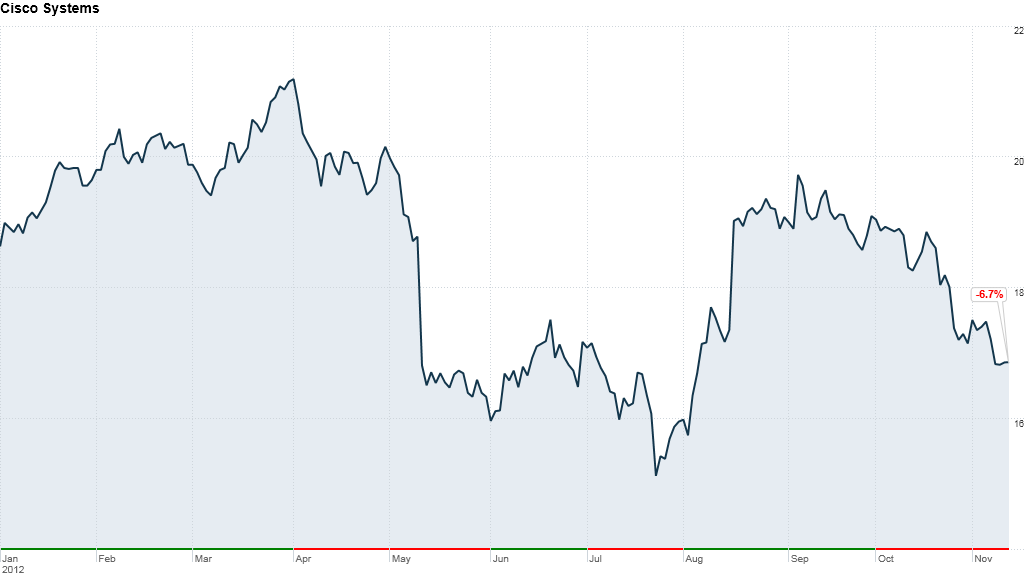In the face of a fiscal cliff in the United States, economic turmoil in Europe, and slowing growth in China, Cisco continues to prove that it can grow its profits and sales.
It's hard to sell networking equipment to businesses and governments when customers are worried that the shaky global economy could teeter in the wrong direction. But Cisco's quarterly results managed to beat Wall Street's expectations, buoyed by big bets on fast-growing Internet business trends. Shares of Cisco (CSCO) rose more than 8% in after-hours trading.
The San Jose, Calif.-based networking giant said its net income increased 18% to $2.1 billion in its fiscal first quarter, which ended in October. Results included one-time charges totaling $500 million. Without the charges, Cisco earned 48 cents per share. Analysts polled by Thomson Reuters, who typically exclude one-time items from their estimates, had forecast earnings of 46 cents per share.
Sales rose 5.5% to $11.9 billion, topping analysts' forecasts of $11.8 billion.
During the current quarter, Cisco said it expects sales to grow between 3.5% and 5.5% and earnings per share of 47 cents to 48 cents -- pretty much in line with analysts' expectations.
Strategy pays off
Sales of Cisco's core switching and routing products last quarter slipped 2%. Yet huge gains in online video services (up 30%), wireless networking equipment (up 38%) and data centers (up 61%) more than made up for the slump in traditional networking orders. Video is now Cisco's third-largest business, with more than $1 billion in sales.
Product orders were flat year-over-year though. Orders sank 10% in Europe and the Middle East and were up just a tepid 2% in North and South America. Yet Asian orders grew by 7%, helping to balance out the big drop in Europe.
Chambers said the United States continues to slowly improve -- though it's too early to call it a trend, "we like what we see," he noted. But Chambers added that the European economy will likely get worse before it gets better.
Sales to consumers and service providers, such as cable and wireless companies, offset soft sales to governments and schools, which continued to be a weak point for Cisco. Public sector orders fell 6% in the quarter, and corporations ordered 1% less equipment than a year ago.
Cisco's ability to keep growing is largely due to the company's ongoing transition from a seller of Internet network equipment to a strategic services provider.
"Last quarter's results are proof that our evolution of the vision of this market and Cisco's role in it are playing out as expected," said John Chambers, Cisco's CEO, on a conference call with analysts.
With a truly global reach and a wide array of product offerings, Cisco is often viewed as a bellwether of the global economy. Though Cisco's sales have slowed from their typical double-digit growth rates of years' past, Cisco has been able to weather the storm better than its networking rivals. Numerous acquisitions, a strong sales force and a $45 billion cash cushion have helped.
Shares of Cisco are down about 7% this year, compared with 15% at Juniper Networks (JNPR), 18% for F5 Networks (FFIV) and 29% at troubled Alcatel-Lucent (ALU).


